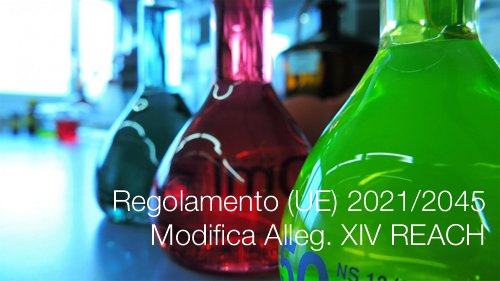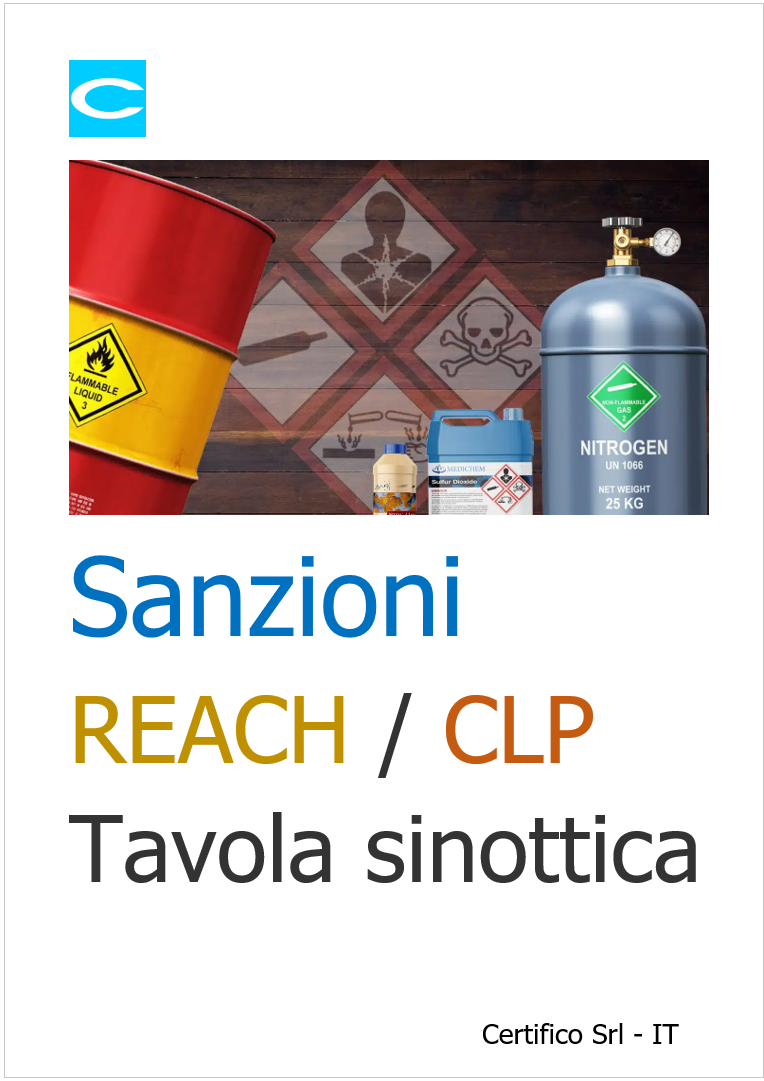// Documenti disponibili n: 46.221
// Documenti scaricati n: 35.928.561
Orientamenti dell'Unione sul regolamento (UE) n. 10/2011 riguardante i materiali e gli oggetti di materia plastica destinati a venire a contatto con i prodotti alimentari, per quanto concerne le informazioni all'interno della catena di approvvigionamento.
Il presente documento orientativo fa parte di una serie di documenti redatti allo scopo di fornire orientamenti sull'applicazione del regolamento (UE) n. 10/2011 riguardante i materiali e gli [...]
ECHA has evaluated the risk of substances in recycled rubber that is used on artificial sports pitches. Based on the evidence, ECHA has concluded that the concern for players on these pitches, including children, and for workers who install and maintain them is very low. ECHA will update its evaluation as and when new information becomes available.
Helsinki, 28 February 2017 – In June 2016, the European Commission asked ECHA to evaluate the risk [...]
In linea con l'articolo 117, paragrafo 2, del regolamento REACH, ogni cinque anni l'ECHA presenta alla Commissione europea una relazione sul funzionamento dello stesso Regolamento REACH. L'Agenzia inserisce nella relazione "le informazioni sulla trasmissione comune dei dati a norma dell'articolo 11 e una rassegna delle spiegazioni formulate per trasmettere separatamente le informazioni.
This is the second five year report the Agency has produced on the implementation of the REACH and CLP [...]
Allegati tutti i documenti d'orientamento che sono disponibili sul sito ECHA. relativi ai biocidi, Regolamento (UE) 528/2012 (BPR)
Il regolamento sui biocidi (BPR, regolamento (UE) 528/2012) concerne l'immissione sul mercato e l'uso di biocidi, utilizzati per la tutela dell'uomo, degli animali, dei materiali o degli articoli contro organismi nocivi, quali parassiti o batteri, mediante l'azione dei principi attivi contenuti nel biocida. Lo scopo del regolamento è migliorare il funzionamento del mercato dei biocidi [...]
Versione 3.1 Novembre 2015
Questa guida fornisce informazioni su aspetti di cui tenere conto quando si compila una scheda di dati di sicurezza (SDS), ossia dettagli sulle prescrizioni relative alle informazioni che devono essere presenti in ciascuna sezione di una SDS – in particolare dettagli sulle modifiche derivanti dalle diverse revisioni dell'allegato II di REACH (Regolamento (CE) 1907/2006) e i periodi transitori per attuare tali modifiche.
Nella guida viene [...]
Pubblicata la versione tradotta IT ad Ottobre 2015
Versione 3.0 Agosto 2015
Questa guida fornisce informazioni su aspetti di cui tenere conto quando si compila una scheda di dati di sicurezza (SDS), ossia dettagli sulle prescrizioni relative alle informazioni che devono essere presenti in ciascuna sezione di una SDS - in particolare dettagli sulle modifiche derivanti dalle diverse revisioni dell'allegato II di REACH e i periodi [...]
Il manuale, aggiornato a dicembre 2016, raccoglie un insieme di raccomandazioni in grado di garantire una gestione sicura dei prodotti fitosanitari nel loro complesso.
È strutturato in capitoli specifici e illustra le diverse fasi che vanno dal momento dell’acquisto fino a quello dello smaltimento dei contenitori. Nelle diverse fasi vengono evidenziati gli aspetti più rilevanti nell'ottica di minimizzare i potenziali rischi di contaminazione di tipo puntiforme e, contestualmente,
Anno 2015
Il documento intende fornire un quadro nazionale delle attività di controllo, effettuate nel corso dell’anno 2015, per la verifica di conformità dei prodotti chimici al Regolamento (CE) n. 1907/2006 (REACH) e alla normativa in materia di classificazione, etichettatura ed imballaggio delle sostanze e delle miscele in attuazione del «Piano Nazionale dei Controlli sull’applicazione del Regolamento REACH-CLP Anno 2015», adottato dall’Autorità Competente Nazionale REACH-CLP, presso la DG Prevenzione sanitaria del [...]
Linea Guida Assogastecnici per la redazione di Etichette e Schede di Dati di Sicurezza per le principali categorie di Miscele
Etichette e Schede di Dati di Sicurezza (SDS) sono uno dei tanti esempi di interazione tra i Regolamenti REACH e CLP, in quanto sono regolamentate dal primo e influenzate dai criteri di classificazione previsti dal secondo (che, ricordiamo, si rifanno al GHS, il sistema globale armonizzato della classificazione ed etichettatura delle sostanze chimiche promosso dall’ONU)
Documento orientativo per la classificazione dei prodotti fitosanitari in applicazione al Regolamento (CE) 1272/2008
Il presente documento offre una serie di orientamenti di base in merito alle modalità operative ed ai criteri stabiliti dal nuovo Regolamento (CE) 1272/2008 relativo alla classificazione, all’etichettatura e all’imballaggio (Classification, Labelling and Packaging, CLP) delle sostanze e delle miscele entrato in vigore il 20 gennaio 2009 negli Stati membri dell’Unione Europea.
In particolare, il presente lavoro rappresenta un documento di orientamento per la [...]
Formato: doc
The CSR template (section 9 and 10) suggests how the information as required in Annex I of REACH can be reported.
1. Chemical Safety Report - (Section 9 and 10) for non PBT/vPvB substances
2. Chemical Safety Report - (Section 9 and 10) for substances (considered as) PBT/vPvB
Sections 1 to 8 of the CSR Part B can be generated by the CSR IUCLID plug-in:
https://iuclid.eu/
ECHA 2017
Regolamento (CE) n. 1907/2006 REACH
REACH Allegato I
Disposizioni generali [...]
The European Chemicals Agency (ECHA)/semiconductor industry collaboration was established to gain practical experience in generating exposure scenarios (ESs) that would be integral elements of the chemical safety report (CSR).
The examples are related to industrial use of three substances in production of semiconductor devices (“microchips”).
Project participants strove to achieve a high level of understanding of semiconductor (SC) processes through information sharing and a site visit to observe actual semiconductor manufacturing operations. Although not all [...]
Guida CLP - IT 2a Edizione 09.2016
Guida all'etichettatura e all'imballaggio a norma del regolamento (CE) n. 1272/2008 - CLP
Il presente documento descrive le disposizioni specifiche per l’etichettatura e l’imballaggio di sostanze e miscele chimiche di cui ai titoli III e IV del regolamento (CE) n. 1272/2008
(regolamento CLP o "CLP").
Lo scopo del presente documento è assistere i fabbricanti, gli importatori, gli utilizzatori a valle e i distributori di sostanze e miscele nell’efficace [...]
The Guide helps suppliers and recipients of safety data sheets to compile and understand substance and use information.
The Guide was originally an interactive online publication that provided information for the recipients of safety data sheets and exposure scenarios in a user-friendly way. It has now been updated to include useful tips for suppliers on issues to watch out for within each section.
At the same time, it has been converted into [...]
Classification, and Labelling guide in accordance with EC Regulation 1272/2008
The document gives guidance for the classification and labelling for products that meet all of the following criteria:
a) the products are defined as “gases” according to the CLP Regulation with the addition of two liquids (Hydrogen fluoride and Methylbutene)
b) they are all allowed to be put on the market in the EU i.e. they have either an EC number, they have been pre-registered or registered [...]
Materiali e gli oggetti di materia plastica destinati a venire a contatto con i prodotti alimentari
Orientamenti dell'Unione sul regolamento (UE) n. 10/2011 (Regolamento materie plastiche) riguardante i materiali e gli oggetti di materia plastica destinati a venire a contatto con i prodotti alimentari, per quanto concerne le informazioni all'interno della catena di approvvigionamento
Il presente documento orientativo fa parte di una serie di documenti redatti allo scopo di fornire orientamenti sull'applicazione del regolamento (UE)
Disaster risk prevention can be regarded as a facet and as a result of sustainable development.
Standards help businesses and organizations progress towards all three dimensions of sustainable development –environmental, economic and social – and at the same time help them address and, in some cases, completely master risks that without proper management would have disastrous consequences.
In each of these dimensions, at the same time as standards help deliver on development and growth, they [...]
As part of comparability of the data which ensures free safe trade in the European Union (EU), the Community Reference Laboratory (CRL) and National Reference Laboratories (NRLs) for Food Contact Materials (FCM) under Regulation EC No 882/2004 have a duty to exemplify a unified position on sampling and test conditions when these are not explicitly established or detailed in existing Directives/Regulations, and without prejudice to those.
For plastic food contact [...]
This document explains the fire hazards resulting from handling oxygen and the relevant protective measures that should be taken.
This document consists of three parts. Part I, is intended for line managers and supervisors.
It provides the background to the subject and a description of the fire and explosion hazards associated with oxygen and oxygen enriched atmospheres.
Part II, is Appendix B, and is a summary of Part I suitable to be produced as a [...]
Allegato il Modello di Richiesta esenzione
La domanda di concessione, di rinnovo o di revoca di un’esenzione è inoltrata alla Commissione in conformità dell’allegato V (Art. 5).
La direttiva 2011/65/UE (RoHS 2) limita l'uso di alcune sostanze pericolose nelle apparecchiature elettriche ed elettroniche (AAE) immesse nel mercato europeo.
Se un articolo rientra nell'ambito di applicazione delle apparecchiature stabilite dalla direttiva RoHS 2, deve essere controllato assicurando che [...]
A practical Guide to understanding the specific obligations of recast Directive 2011/65/CE on the Restriction of the Use of Certain Hazardous substances in EEE (RoHS II)
Directive 2002/95/EC on the Restriction of Use of Certain Hazardous Substances in Electrical and Electronic Equipment (known as the “RoHS Directive” or “RoHS I”) restricts the use of lead, cadmium, mercury, hexavalent chromium, polybrominated biphenyls and polybrominated diphenylethers in certain electrical and electronic equipment since 1 July 2006.
In December 2008, the European Commission [...]
Hydrocarbon & Oxygenated Solvents
This document is one of a series of 'Best Practice Guidelines' published by the European Solvents Industry Group (ESIG).
It aims to assist solvent users, particularly Small and Medium Size Enterprises (SMEs), in using both hydrocarbon and oxygenated solvents safely.
This guide is aimed at managing solvent exposure in relation to the inhalation of vapour, and does not cover other health, safety and environmental impact. However, it is standard industry practice [...]
In Europe, degassing of Rail Tank Cars (rtc’s) is mostly done at rtc workshops and not at specialised cleaning stations. Workshops offer this activity as an extra service to their customers.
The degassing operations and associated activities like tank entry and nitrogen purging, are hazardous activities which require the right equipment, skilled personnel, detailed procedures and, above all, a proper safety management system.
The scope of this document includes:
- Degassing (gas freeing) of rtc’s [...]
The objective of the present guidelines is to promote the use of the appropriate equipment for the transport of packed chemical cargo.
The scope of these guidelines includes existing and new transport vehicles, trailers and containers used for:
- the different modes of transport except air transport;
- the carriage of palletized and non-palletized packed cargo;
- the transport of dangerous and non-dangerous goods;
- FTL (full truck loads) and LTL (less than [...]
La presente guida è rivolta a tutte le imprese del settore manifatturiero, che utilizzano prodotti chimici nello svolgimento delle proprie attività industriali o artigianali e che sono definiti dal regolamento REACH come “utilizzatori a valle”.
Il presente documento ha lo scopo di riassumere i principali obblighi dell’utilizzatore a valle e di fornire istruzioni operative per il relativo adempimento; è stato realizzato seguendo le linee guida dell’ECHA. E’ bene sottolineare che le [...]
The new release date for the update of ECHA's Chemical Safety Assessment and Reporting tool, Chesar, is 21 June 2016.
Helsinki, 19 May 2016 – The webinar on Chesar 3 will be on the same day. Those who are taking part in the webinar will be given access to the application beforehand to get familiar with it. So, if you are still planning to register for the webinar, do it soon.
At the same time,
Focus
The Biocidal Product Regulation (BPR, Regulation (EU) 528/2012) concerns the placing on the market and use of biocidal products, which are used to protect humans, animals, materials or articles against harmful organisms, like pests or bacteria, by the action of the active substances contained in the biocidal product.
The Biocidal Products Regulation (BPR, Regulation (EU) 528/2012) concerns the placing on the market and use of biocidal products, which are used to protect humans, animals, materials or [...]
Guidance to help employers and workers to manage the transition to the new classification, labelling and packaging system.
This document is intended to provide practical guidance to employers and workers on how the directly acting CLP regulation ((EC) No 1272/2008 on the classification, labelling and packaging of substances and mixtures) will affect the following worker protection directives:
- chemical agents directive (98/24/EC);
- carcinogens and mutagens directive (2004/37/EC);
- safety signs directive (92/58/EEC);
- pregnant workers [...]
A new version of IUCLID, used for creating REACH and CLP dossiers, is now available for companies to use. Manuals and plug-ins are also updated.
Helsinki, 29 April 2016 – IUCLID 6 is based on updated technology and includes updated formats, which accommodate the changes to the annexes to the REACH Regulation and test guidelines. Installing the tool on a desktop computer is much easier than before and can be done in a few clicks.
IUCLID 6 contains [...]

Regolamento (UE) 2021/2045 della Commissione del 23 novembre 2021 che modifica l’allegato XIV del...

ID 24419 | 13.08.2025
Consultazione sull'estensione delle scadenze transitorie per la presentazione della registrazione REACH nel Reg...

ID 23401 | 05.02.2025 / In allegato
In maniera sintetica ed in forma di tabella sinottica si riportano le sanzioni disciplinate dalla normativa i...
Testata editoriale iscritta al n. 22/2024 del registro periodici della cancelleria del Tribunale di Perugia in data 19.11.2024